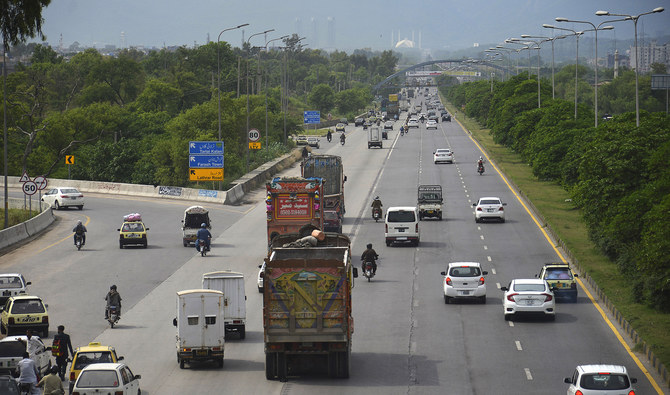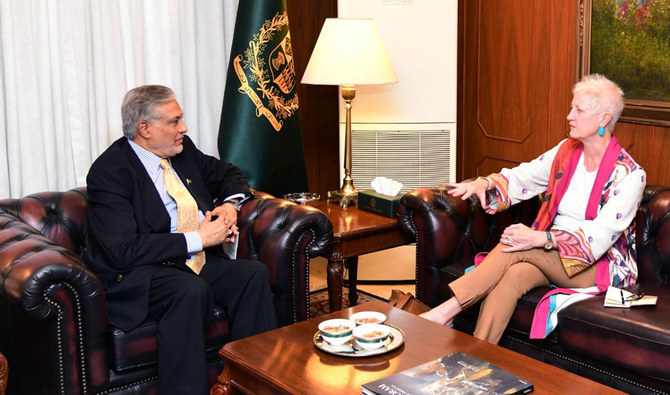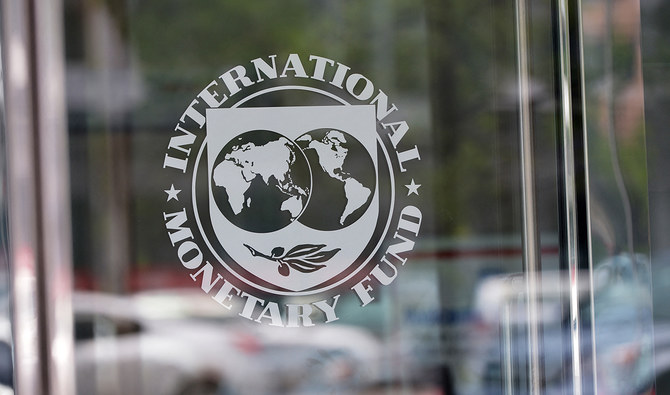KARACHI: As Pakistan focuses on stimulating growth and creating jobs in the upcoming federal budget, the country’s business community called for slashing taxes and introducing relief measures to bring the economy out of its sluggish mode while economists predicted that revenue collection would continue to constitute a major challenge for the government.
Pakistan is expected to present its income and expenditure plan for the next fiscal year (FY2020-21) in the coming week, with a focus to spur the economic growth without imposing new taxes.
“The focus of the upcoming budget is to stimulate growth and create jobs. The focus of the [$8 billion] stimulus package is toward providing support to business, in particular [small and medium enterprises] through payroll loans at subsidized rates, deferral of principal and interest payments for one year and quick disbursement of all as refunds to business,” Dr. Abdul Hafeez Shaikh, Adviser to Prime Minister on Finance and Revenue, told Arab News last week in an exclusive interview.
He also categorically denied that there would be new taxes in the upcoming budget.
Pakistan’s business community expects that the government will come up with a relief package for the revival of the country’s economy to avoid its further weakening amid the COVID-19 pandemic.
“We have proposed that the government should give relief to industries across the board like the one given to the construction industry because it is vital for the revival of the economy,” Agha Shahab Ahmed Khan, President of the Karachi Chamber of Commerce and Industry (KCCI), told Arab News. “The reforms and recovery will automatically follow.”
Industrialists say the government must focus on the means of creating wealth by adopting appropriate measures and offering suitable incentives such as the ones witnessed in other countries. “If there is no wealth creation, there will be no wealth distribution. This may also lead to social disruption in the country,” the KCCI president said, adding: “We have suggested that sales tax should be brought down to a single digit from 17 percent to spur business activities.”
Industrialists also hope that apart from revising the tax rates, the number of taxes will also be reduced by the government. “We expect that the number of taxes will reduce as part of the ease of doing business initiative under the current circumstances. In Punjab, the government has imposed about 130 different taxes,” Almas Hyder, an industrialist and former president of the Lahore Chamber of Commerce and Industry (LCCI), told Arab News.
“The government must expedite the refund process,” she continued, adding: “I say this because this has impacted the cash flow of companies.”
Muhammad Ahmed, President of the Islamabad Chamber of Commerce and Industry (ICCI), concurred with Hyder, saying: “There is no doubt that refunds are being paid, but income tax refunds have not been issued. We should be given permission to adjust that money with the government in the shape of customs duties or sales tax.”
The ICCI president called for measures to make the upcoming budget business-friendly in the prevailing environment.
“The budget should be business-friendly since that will help us make the economy flourish. If new businesses cannot be set up, at least the existing ones that have suffered setbacks should be allowed to survive and sustain in these difficult times,” he added.
As business community demands relief in the upcoming budget, the country’s economists predict that the government is likely to face major revenue constraints due to a decline in the collection rate within the current economic framework. “If you have no income, you will not be able to make expenditures,” Dr. Abdul Qayyum Suleri, member of the government’s Economic Advisory Council (EAC), told Arab News.
“The second major challenge the government is facing is the locust attack which is going to cost the country about Rs 1 trillion in the worst case scenario. If the damage is contained, the loss will be about Rs 250 billion,” he added.
However, Dr. Khaqan Najeeb, who was part of the budget-making process last year since he worked as an adviser with the finance ministry, suggested that the next budget could be crafted with a different approach, keeping in mind resource generation through tax compliance, deficit reduction by curtailing expenditures, and deficit financing by shifting to non-debt creating instruments.
“Shifting the financing of budget to non-debt creating instruments is the only way to flatten the curve on debt build-up. Divestment, past recoveries, collecting dividends from state-owned companies, arrears of taxes and energy, all can contribute in financing the deficit. This can restore the public’s flagging faith in the integrity of the policymakers to break the debt cycle,” he added.
Dr. Suleri said that apart from debt servicing, defense and administrative costs and development expenditure’s additional resources would be required to fund the health sector and locust control operations.
“Pakistan will need about $15 billion of additional borrowing amid remittance, foreign investment and export decline,” he noted while observing: “Two sectors – energy and loss making public sector enterprises – will be under pressure since the International Monetary Fund may object to budget allocations. Increase in salaries and pensions may fall into this category.”
Economists expect that few ongoing development projects will be financed while major share of funds is likely to be diverted to the health sector in the current situation.
Pakistan’s industrialists hope for tax cuts, relief measures in budget
https://arab.news/vaund
Pakistan’s industrialists hope for tax cuts, relief measures in budget

- Business community demands reduction in rates and number of existing taxes for the revival of sluggish economy
- Economists believe revenue collection and locust control will pose major challenges to the government
Pakistan commends UAE leadership for ‘swift’ response to record-breaking rains

- Pakistan’s foreign minister telephones UAE counterpart, expresses sympathy over devastation caused by torrential rains
- Heavy rains lashed UAE last week, turning streets into rivers and hobbling Dubai airport, world’s busiest for global passengers
ISLAMABAD: Pakistan’s Foreign Minister Ishaq Dar on Wednesday commended the United Arab Emirates (UAE) leadership for its swift and efficient response to the devastation caused by record-breaking rains in the desert country.
Heavy rains lashed the desert country last week, turning streets into rivers and hobbling Dubai airport, the world’s busiest for international passengers.
The rainfall was the UAE’s heaviest since records began 75 years ago, dumping two years’ worth of rain on the desert country.
“Foreign Minister Ishaq Dar held telephone conversation with Foreign Minister His Highness Sheikh Abdullah Bin Zayed of United Arab Emirates to express deepest sympathy on the devastation caused by recent torrential rains,” Pakistan’s Ministry of Foreign Affairs (MoFA) said.
“He commended the leadership of the UAE for the swift, efficient and timely administrative response to this natural calamity,” it added.
The foreign ministry said both representatives also exchanged views on matters of bilateral and global importance.
Pakistan’s PM Sharif last Friday telephoned UAE President Sheikh Mohamed bin Zayed Al-Nahyan, urging both countries to collaborate to tackle the impacts of climate change.
Sharif had lauded the UAE president for his “outstanding leadership qualities” and strong commitment to ensure the welfare of the Emirati people.
Pakistan has been prone to natural disasters and consistently ranks among one of the most adversely affected countries due to the effects of climate change. Torrential rains have killed more than 90 people in the South Asian country this month, according to authorities.
Malala Yousafzai faces backlash for Clinton musical co-credit

- Malala Yousafzai co-produced “Suffs” musical with Hillary Clinton, which depicts American women’s struggle for right to vote
- Yousafzai has been condemned by some for partnering with Clinton, an ardent supporter of Israel’s war on Palestine
LAHORE: Nobel laureate Malala Yousafzai faced a backlash in her native Pakistan on Wednesday, after the premier of a Broadway musical she co-produced with former US Secretary of State Hillary Clinton.
The musical, titled “Suffs” and playing in New York since last week, depicts the American women’s suffrage campaign for the right to vote in the 20th century.
However Yousafzai, who was awarded the Nobel Peace Prize in 2014, has been condemned by some for partnering with Clinton, an outspoken supporter of Israel’s war against Hamas.
Pakistan has seen many fiercely emotional pro-Palestinian protests since the war in Gaza began last October.
“Her theater collaboration with Hillary Clinton — who stands for America’s unequivocal support for genocide of Palestinians — is a huge blow to her credibility as a human rights activist,” popular Pakistani columnist Mehr Tarar wrote on social media platform X.
“I consider it utterly tragic.”
Whilst Clinton has backed a military campaign to remove Hamas and rejected demands for a ceasefire, she has also explicitly called for protections for Palestinian civilians.
Yousafzai has publically condemned the civilian casualties and called for a ceasefire in Gaza.
The New York Times reported the 26-year-old wore a red-and-black pin to the “Suffs” premier last Thursday, signifying her support for a ceasefire.
But author and academic Nida Kirmani said on X that Yousafzai’s decision to partner with Clinton was “maddening and heartbreaking at the same time. What an utter disappointment.”
Israel’s military offensive has killed at least 34,262 people in Gaza, mostly women and children, according to the Hamas-run territory’s health ministry.
The war began with an unprecedented Hamas attack on October 7 that resulted in the deaths of around 1,170 people, according to an AFP tally of Israeli official figures.
Clinton served as America’s top diplomat during former president Barack Obama’s administration, which oversaw a campaign of drone strikes targeting Taliban militants in Pakistan and Afghanistan’s borderlands.
Yousafzai earned her Nobel Peace Prize after being shot in the head by the Pakistani Taliban as she pushed for girl’s education as a teenager in 2012.
However the drone war killed and maimed scores of civilians in Yousafzai’s home region, spurring more online criticism of the youngest Nobel Laureate, who earned the prize at 17.
Yousafzai is often viewed with suspicion in Pakistan, where critics accuse her of pushing a Western feminist and liberal political agenda on the conservative country.
Pakistan’s foreign minister calls for early resumption of PIA flights to Europe

- Foreign Minister Ishaq Dar meets EU ambassador to discuss bilateral ties, trade and matters of mutual interest
- PIA flights to Europe and the UK have been suspended since 2020 following Pakistan’s infamous pilot license scandal
ISLAMABAD: Pakistan’s Foreign Minister Ishaq Dar on Wednesday stressed the resumption of direct flights from the country’s national airline to Europe, the foreign ministry said, in his meeting with EU Ambassador Riina Kionka during which both sides discussed bilateral relations, trade and matters of mutual interest.
PIA flights to Europe and the UK have been suspended since 2020 after the EU’s Aviation Safety Agency revoked the national carrier’s authorization to fly to the bloc following a pilot license scandal that rocked the country. The issue resulted in the grounding of 262 of Pakistan’s 860 pilots, including 141 of PIA’s 434.
Kionka and Dar discussed Pakistan-EU bilateral ties and important issues of mutual interest during their meeting, Pakistan’s Ministry of Foreign Affairs (MoFA) said. Dar told Kionka Pakistan views the EU as a “valued partner” and an important factor of stability during the current volatile times.
“FM emphasized the significance of direct flights between Pakistan and European countries in view of large diasporas,” MoFA said. “In this regard, he stressed on the need for an early resumption of PIA flights to Europe.”
Both sides also expressed satisfaction over the “significant progress” of Pakistan-EU institutional mechanisms and resolved to maintain the upward trajectory of their relations by increasing their high-level interactions.
“FM vowed to further strengthen the existing strategic partnership in all areas, inter alia, trade, migration, climate change,” MoFA said.
“The EU side assured their full cooperation to Pakistan in achieving the objectives of economic diplomacy.”
The EU is Pakistan’s second most important trading partner, accounting for over 14 percent of the country’s total trade and absorbing 28 percent of Pakistan’s total exports. Pakistani exports to the EU are dominated by textiles and clothing.
Pakistan’s GSP+ status is a special trade arrangement offered by the EU to developing economies in return for their commitment to implement 27 international conventions on human rights, environmental protection and governance.
Pakistan, Egypt among countries who pay most in surcharges to IMF— report

- Indebted member countries paid about $6.4 billion in surcharges between 2020-2023, says report by US think tanks
- Surcharges do not hasten repayment, instead punish countries already struggling with liquidity constraints, critics say
Countries, mostly middle and lower-income, have been burdened by surcharges on top of interest payments on their borrowings from the International Monetary Fund (IMF), widening global inequities, according to a report by US think tanks.
WHY IT’S IMPORTANT
Indebted member countries paid about $6.4 billion in surcharges between 2020-2023, the report from Boston University’s Global Development Policy Center and Columbia University’s Initiative for Policy Dialogue released on Tuesday showed.
And the number of countries paying these surcharges has more than doubled in the last four years.
The IMF is expected to charge an estimated $9.8 billion in surcharges in the next five years, according to an earlier report by the Center for Economic and Policy Research.
Critics of the policy argue that surcharges do not hasten repayment and instead punish countries already struggling with liquidity constraints, increase the risk of debt distress and divert scarce resources that could be used to boost the struggling economies.
BY THE NUMBERS
Countries such as Ukraine, Egypt, Argentina, Barbados and Pakistan pay the most in surcharges, the report showed, accounting for 90 percent of the IMF’s surcharge revenues.
These surcharges, levied on top of the fund’s increasingly steeper basic rate, are IMF’s single largest source of revenue, accounting for 50 percent of total revenue in 2023.
KEY QUOTES
“IMF surcharges are inherently pro-cyclical as they increase debt service payments when a borrowing country is most need of emergency financing,” Global Development Policy Center’s director Kevin Gallagher said.
“Increasing surcharges and global shocks are compounding the economic pressure on vulnerable countries.”
CONTEXT
Data published by the Institute of International Finance earlier this year showed global debt levels hit a record of $313 trillion in 2023, while the debt-to-GDP ratio — a reading indicating a country’s ability to pay back debts — across emerging economies also scaled fresh peaks.
IMF shareholders agreed last week on the importance of addressing challenges faced by low-income countries, Managing Director Kristalina Georgieva said on Friday.
ICC names Pakistan’s Sana Mir as Women’s T20 World Cup Qualifier ambassador

- Sana Mir led Pakistan in 137 of 226 international matches she played during her career
- Mir says will guide teams and players on how to deal with pressure in the tournament
ISLAMABAD: The International Cricket Council (ICC) on Wednesday named Pakistan’s former iconic cricketer Sana Mir as its ambassador for the upcoming Women’s T20 World Cup Qualifier tournament.
Former skipper Mir, considered widely as Pakistan’s best woman cricketer to date, will keep a keen eye on the tournament which would see 10 women’s teams battle it out for two spots at the ICC Women’s T20 World Cup 2024.
The first four matches of the tournament will take place tomorrow, Thursday, which is scheduled to go on till May 7.
The 10 teams have been divided into two groups of five, with the top two from each group entering the semifinals. The winning semifinalists confirm a trip to Bangladesh for the T20 World Cup later this year.
“ICC named Sana Mir, who represented Pakistan in 226 international games, 137 of them as skipper, as the ambassador of the Women’s T20 World Cup Qualifier on Wednesday, 24 April,” the cricket regulatory body said in a post on its website.
Mir told ICC the tournament would provide an excellent opportunity for fans to witness exciting cricket.
“The women’s game has become more and more competitive in recent years,” Mir said. “And the 10 nations involved in the Qualifier possess a number of quality players.”
Mir featured in several ICC tournaments during her impressive career. Her most memorable one was in the 2008 ICC Women’s Qualifying Series for the Women’s Cricket World Cup where Pakistan went all the way to the finals.
Sana won the joint Player of the Series award for the tournament. The Pakistani icon said she aims to share her expertise and experience with the international players as ambassador.
“My aim is to talk to the various teams and players during the Qualifier and help guide them on how to deal with the pressure of these events and what it takes to succeed,” Mir explained.
“Pakistan had a great record in these events, and I in particular have fond memories of the 2008 edition of the 50 over World Cup qualifier event that I played.”
Mir said that while Sri Lanka and Ireland were favorites to qualify for the World Cup, others had a chance to cause major upsets too.
“Teams like Scotland, Netherlands, United Arab Emirates, Uganda, and Zimbabwe surely have the potential to cause major upsets,” she said. “And make their way through to the semis and eventually to the final as well.”










